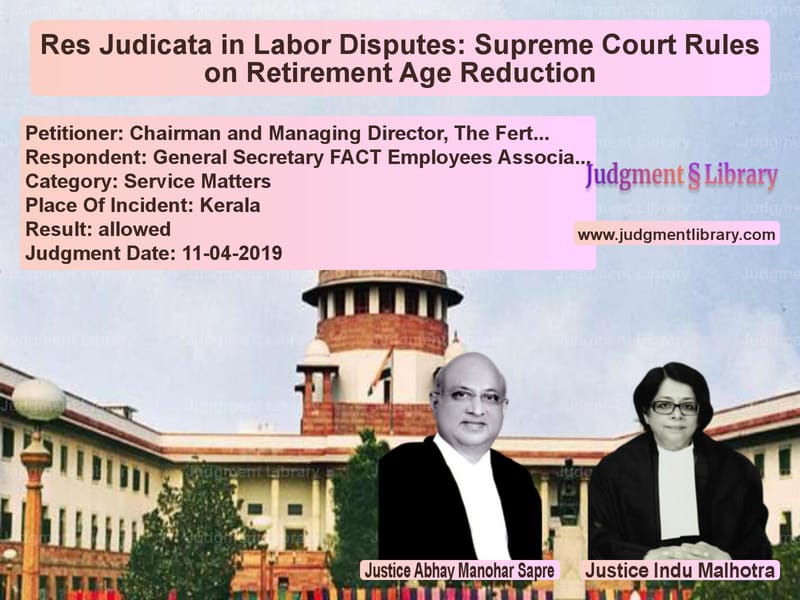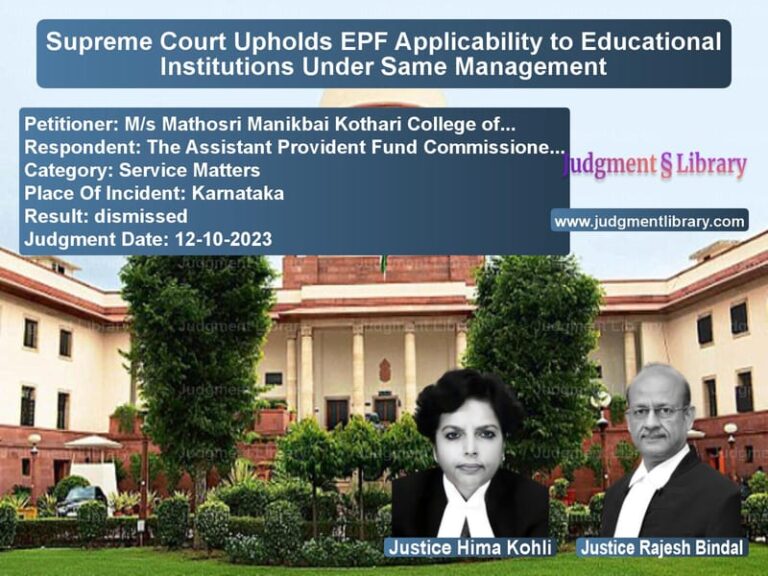Res Judicata in Labor Disputes: Supreme Court Rules on Retirement Age Reduction
The Supreme Court of India recently ruled on the applicability of the doctrine of res judicata in labor disputes, particularly in the case of Chairman and Managing Director, The Fertilizers and Chemicals Travancore Ltd. vs. General Secretary FACT Employees Association & Ors. The case concerned the reduction of the retirement age of pre-1978 employees from 60 years to 58 years, which had been previously adjudicated and was once again brought before the courts.
The Supreme Court reaffirmed that once an issue has been conclusively decided, it cannot be reopened in subsequent proceedings, including labor adjudication. The Court set aside the Kerala High Court’s ruling and restored the awards of the Labour Court, which had refused to entertain the matter on the ground of res judicata.
Background of the Case
The appellant, The Fertilizers and Chemicals Travancore Ltd. (FACT), is a Public Sector Undertaking (PSU) engaged in the manufacture and sale of fertilizers and chemicals. The dispute arose when the company, facing severe financial constraints, reduced the retirement age of employees recruited before 1978 from 60 years to 58 years.
This decision led to opposition from employee unions, who argued that the reduction violated a previous agreement. The case went through multiple rounds of litigation:
- Initially, the Kerala High Court upheld the company’s decision.
- The matter was taken to the Supreme Court, which dismissed the employee unions’ petitions.
- Despite this, the Kerala government referred the matter again to the Labour Court, which ruled against the employees citing res judicata.
- The Kerala High Court set aside the Labour Court’s decision and ruled in favor of the employees.
- The company then appealed to the Supreme Court.
Arguments by the Petitioner (FACT Ltd.)
The PSU put forth the following arguments:
- The issue of retirement age had already been litigated and decided by the Kerala High Court and the Supreme Court.
- Once the Supreme Court dismissed the employees’ challenge, the issue attained finality and could not be re-litigated.
- The principle of res judicata applied to labor disputes, barring any further proceedings on the same issue.
- The Labour Court correctly ruled that it lacked jurisdiction to entertain a matter that had already been decided by the courts.
Arguments by the Respondent (FACT Employees Association)
The employees countered with the following arguments:
- The change in retirement age violated their legitimate expectations and the prior agreement with the company.
- The government was within its rights to refer the matter to the Labour Court.
- The Labour Court should have independently examined the issue rather than dismissing it on procedural grounds.
- The decision to lower the retirement age unfairly affected employees who had been with the company before 1978.
Supreme Court’s Observations and Verdict
The Supreme Court, after reviewing the case history, ruled in favor of the PSU, stating:
“In our considered view, the question, as to whether the principle of res judicata defined in Section 11 of the Code of Civil Procedure, 1908 applies to the labor proceedings or not, remains no more res integra and stands answered by three decisions of this Court.”
The Court cited the following precedents to support its ruling:
- R.C. Tiwari vs. MP State Co-operative Marketing Federation Ltd. (1997) – This case established that once an issue has been decided in one forum, it cannot be raised again in another, even if the second forum has independent jurisdiction.
- Pondicherry Khadi & Village Industries Board vs. P. Kulothangan (2004) – The Court held that res judicata applies to industrial disputes, preventing repeated litigation on the same issue.
- Executive Engineer, ZP Engg. Divn. vs. Digambara Rao (2004) – Reaffirmed that labor adjudication is subject to res judicata.
The Court noted:
“The effect of passing of these orders was that the issue in relation to reduction of age from 60 to 58 years including all incidental issues arising therefrom, attained finality because they were already decided on the merits between the parties to the Lis.”
Final Ruling
The Supreme Court set aside the Kerala High Court’s decision and restored the awards of the Labour Court:
“The impugned order is set aside and the awards of the Labour Court are restored.”
Significance of the Judgment
This ruling has important implications for labor disputes and industrial relations in India:
- It reinforces the finality of court decisions, preventing repetitive litigation.
- It establishes that res judicata applies to labor adjudication, ensuring that employers and employees cannot keep revisiting the same dispute indefinitely.
- It highlights the importance of financial stability in PSUs, allowing them to take necessary measures for survival.
The judgment provides clarity on the applicability of procedural principles to industrial disputes, ensuring that once an issue is decided, it cannot be reopened in another forum.
Petitioner Name: Chairman and Managing Director, The Fertilizers and Chemicals Travancore Ltd..Respondent Name: General Secretary FACT Employees Association & Ors..Judgment By: Justice Abhay Manohar Sapre, Justice Indu Malhotra.Place Of Incident: Kerala.Judgment Date: 11-04-2019.
Don’t miss out on the full details! Download the complete judgment in PDF format below and gain valuable insights instantly!
Download Judgment: Chairman and Managin vs General Secretary FA Supreme Court of India Judgment Dated 11-04-2019.pdf
Direct Downlaod Judgment: Direct downlaod this Judgment
See all petitions in Pension and Gratuity
See all petitions in Termination Cases
See all petitions in Judgment by Abhay Manohar Sapre
See all petitions in Judgment by Indu Malhotra
See all petitions in allowed
See all petitions in supreme court of India judgments April 2019
See all petitions in 2019 judgments
See all posts in Service Matters Category
See all allowed petitions in Service Matters Category
See all Dismissed petitions in Service Matters Category
See all partially allowed petitions in Service Matters Category







